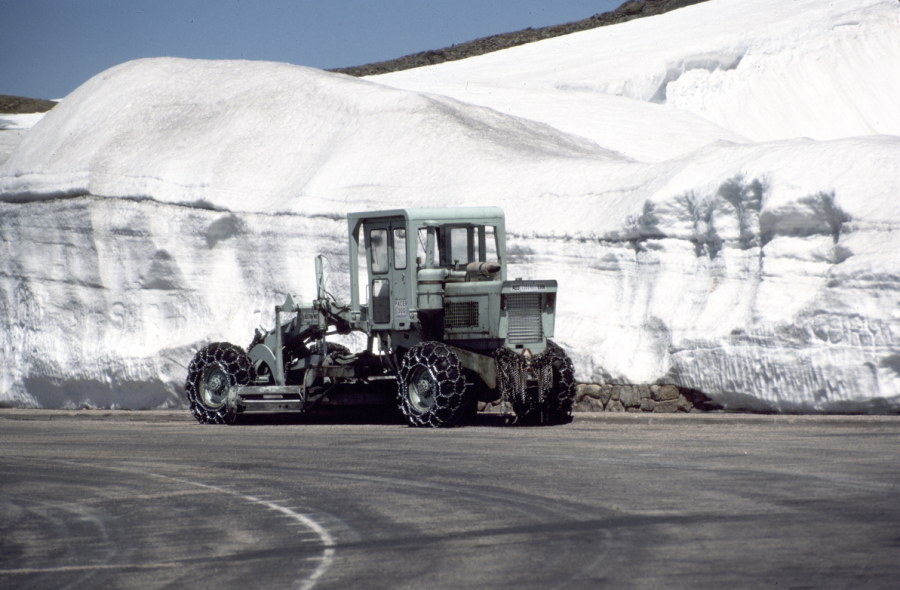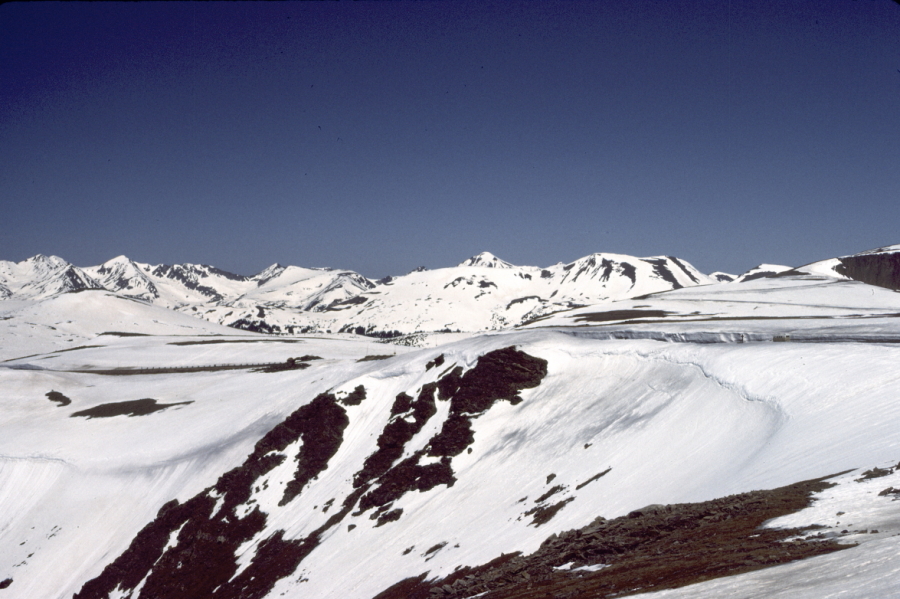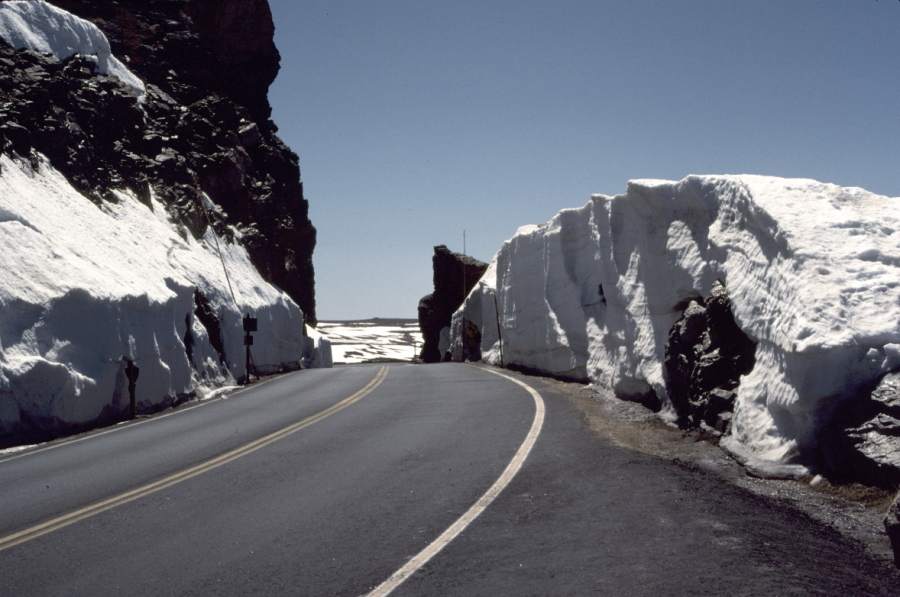Tuesday 21st June
Once again I wake to bright sunshine. It had been another mild night and quite pleasant in our little tent. The ranger's thermometer had shown a low of 60o F (15.5oC) for the day we arrived and I think it must have been about the same last night. I had got up once during the night; outside the air was cool and the sky completely clear, dark and studdied with hundreds of stars. No artificial light, no clouds, just a brilliant sky and starlight. Thank you bladder and the water I drank last night!
By 9:00am we are packed, ready to leave the campsite and we begin our drive along the Trail Ridge Road. This is the route to take through the park. It climbs, with its sweeping curves and vast views, to over 12000 ft (3,700m) into the tundra and across the continental divide. In parts the road is lined with 20 ft (6m) high walls of snow and although it is now late June we learn that the road has only recently become passable. It is closed in Winter and remains closed until late Spring, or even, as we are now, just today, in early Summer.

The views across the park from the road are inspiring. Snowy peaks, open tundra, alpine meadows. It has to be seen, I can't describe it in words. It is too big. We stop several times and take many photographs. I know they will not do it justice. I don't know how to capture the scale, or the space or the feeling of being on the top of the world. Most of my pictures will probably look the same. They will no doubt be very nice and maybe enough for me to think about entering the postcard or Christmas card market, but I know they will not capture the real essence of the place, rendering it down to a two dimensional image.

It is just after midday when we leave the park and begin our onward journey to Yellowstone, another famous national park to tick off our list! Stewart is driving and all I have to do is watch the scenery. I wouldn't mind driving to give him a break but I don't offer, I assume he will ask when he gets tired.
As we leave Colorado and enter Wyoming the landscape becomes flatter. We seem to be driving across a plateau, a flat plain with small hills but our altitude never goes below 5,500 ft (1675m). We are leaving the dramatic, snow capped peaks of the Rockies behind us.
The scenery reminds me of the artificially landscaped, grasses spoil heaps of home: the new greenways and parks created from the black, industrial landscape of coal mining areas. The small grassy hills hint to me, eerily, of an enormous mine, long since abandoned and reclaimed by nature - the summits blunted, the slopes reduced to a non-slip angle and colonised by grass. There are no more tall pine trees to be seen, just small bushes and grass which added to the illusion that we are driving through a large recently reclaimed industrial area.
The states we have travelled through so far on our US journey have been characterised by their vegetation: saguaro cactuses in Arizona, prickly pears in New Mexico, pine trees in Colorado and now the grassland of Wyoming.
We come to another set of road works. They spring up from nowhere, often like this one apparently in the middle of nowhere. I wonder how they decide which stretches of road need to be fixed first or whether on these long, seemingly endless roads, the repair system is similar to the "painting of the Forth Bridge" - perpetual - work along and when complete, start again. In our experience traffic control through roadworks is manual, a young woman (usually) holding a sign, on one side "Stop" and the other "Slow". It must be a boring job. How much do they get paid? Is this all they do? Are they permanent staff or students earning a bit during the college holidays? The United States! A country renowned for its. technology and not a traffic light in sight.
The sign reads "Stop". We wait. A car emblazoned with "Pilot Car. Follow Me", the second one we have seen during our trip, arrives after a few minutes. A couple of vehicles travelling in the opposite direction pass us. The pilot car turns round, the young woman switches her sign to show "Slow" and we follow the car, as instructed. It doesn't take long to realise why there is a pilot car. There is no road to speak off, the road appears to be under construction rather than repair. The pilot car leads us between huge earth movers, busy moving sand and soil, our little car is dwarfed by the plant and engineering equipment as we drive over ruts, dip into troughs, bounce over ridges, dodge around pot holes until we are through the construction zone. The pilot car pulls off to the side and we drive on, passed another young lady with Stop/Slow as it turns round to repeat its shuttle back through the work zone.
Tonight we are staying in a place called Lander. It is a spacious, that is to say, low density, sprawling town, of between nine and ten thousand inhabitants. We see about half a dozen motels, at least two of which are showing "no vacancy" signs and two more have no twin bedded rooms, but finally we find somewhere suitable to stay. Having eaten no cooked food for the best part of 48 hours we head straight out in search of a meal.
We walk down what we assume is the main street, the only street of any significance we can see and everywhere except the cinema and a Safeway's is closed, including, to our dismay, two restaurants. We had not expected this set back. Everywhere we had been so far, including Red River, a place more like a mountain village than a town, there had been a choice of eateries. Now here, after two days camping and looking forward to our first substantial meal in 48 hours we are forced to chose between take away chicken, fast food burger or the restaurant of another motel. We choose the last option which turn out to be a mistake.
The service is terrible and the food, well, at least it is hot fuel for our empty bellies. We both order baked potatoes. Stewart gets chips and I get mashed potato. The waiter hasn't bothered to let us know they were out of baked potato or ask us for a second choice. One glass of water is delivered with my meal and not topped up. The service would be rated low anywhere. If this is the level of service inspired by low pay as motivation to earn big tips, it isn't working. We will not be leaving a large tip here. Maybe this is what the staff have come to expect or maybe this is the stand in on the day off. Is Tuesday a half day in this place? As we won't be visiting again we don't bother to complain.
There are a few others in the restaurant. In one corner a man is hacking his way through a burger, bun and the lot, with the edge of his fork. The filling is seeping out as it squashes rather than slices, under the pressure. I can't help watching him. A knife, untouched, lies at the side of his plate. I'm tempted to call across "Why don't you try the knife?" but I resist. Ignoring knives appears to be part of the culture here, although I can't think why - especially when they are provided, which is not guaranteed. Stewart and I had struggled to eat bean burritos without a handy knife but on that occasion our fellow diners had no such problems, they effortlessly demonstrated the fine art of fork only dining, and put us off asking for knives. Maybe burgers are a tougher proposition or maybe this guy has had a bad day and is taking it out on the burger before eating it. After a few minutes I give up watching him.
The waiter comes out to wipe and re-set a table, which here means moving the sauce bottles and the caddy with the salt and sugar sachets, paper napkins and menu back to the centre. Bright red tomato sauce and almost fluorescent yellow mustard from plastic squeeze bottles doesn't appeal to me but it appears popular, as does salt, and it's becoming a familiar sight to see locals adding copious quantities of these "relishes" to their burgers regardless of the already included garnishes.
We walk back to our motel. American towns, even small towns like this one, seem to be designed around cars and driving. We've seen drive in cinemas, drive through fast food outlets and even a drive through bank. Are they trying to make legs redundant? We wonder how the Americans would cope if they had to pay the same for fuel as people in Europe, in the areas we've visited so far it would be difficult to manage without a car. We don't see anyone else walking. We must look out of place as we make our way back to our motel, not only are we walking but our clothes, our shape and size must single us out as foreign, most obviously our lack of baseball hats.
Whereever we have been we have seen that Americans are attached to their baseball hats. Literally. The guy attacking his burger was wearing one. The UK custom of men removing their hats when indoors hasn't transferred to the US, at least those areas we've visited, but then this part of the country was still the "wild west" in the days that the Eastern states were a British colony, so maybe they were never saddled with the trials and tribulations of English etiquette or manners more to do with ritual than genuine politeness. I wonder whether they take them off in bed or in church, somehow I hope they don't.
So an observation on hats: baseball caps disported in various styles and in all sizes but always of standard shape: tiny caps perched on large heads, the beck pointing up, useless as a sun visor, typically worn by men with large bellies and plump faces, I sense these hats are statement of identity rather than an expression of practicality - "I'm an American, don't mess with me"; large comfortable looking, feel at home caps sitting snuggly on the head with beck shielding the eyes from the glare of the sun, a practical piece of attire well suited to the lifestyle and an indispensable part of every day attire; the obligatory holiday cap, matching hats for all the family - mum, dad, grandpa, grandma and all the kids, look at us we're a happy all American family having fun (and if my kid gets lost in a crowd I can look for the hat or the guy selling ice cream can help him spot us). No wide brimmed, floppy straw hats here.
We arrive back at our motel. Flick through a few TV channels without finding anything but advertisements and so call it a night. Tomorrow we will head for Yellowstone National Park.
